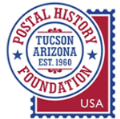
Pathway to the Pacific
The Creation of the Arizona Territory
It all starts with a letter…

On March 23, 1867, a letter from a soldier stationed at Fort Yuma came through the Tucson Post Office. It was addressed to Miss L.A. Tobey of Providence Rhode Island.
This cover is now the oldest known extant from Tucson in the Arizona Territorial period.
Lydia’s letter was posted March 23, 1867, four years after Arizona became a United States Territory and the Tucson Post Office was re-established after the Civil War.
This envelope, now over 150 years old, no longer contains the letter sent to Miss Tobey. But the postmark it bears (however faint and smudged) and the address to which it was sent, still tells a story.
The Tobeys
Miss L.A. Tobey, or Lydia Ann Tobey, was the daughter of Samuel Boyd and Sarah Fry Tobey.
Samuel Boyd was a physician who helped found the Rhode Island Hospital, and was a trustee for the Butler Hospital for the Insane. He was also a trustee and a chancellor at and Brown University. Samuel Boyd Tobey was the vice president of Alumni Association of Friends Yearly Meeting School and a minister of the Society of Friends. He and his family were prominent Quakers in Providence
Sarah Fry Tobey (Lydia Anna’s mother) was very active in the Society of Friends. She met with other leaders and activists, such as Harriet Beecher Stowe, to help decide the causes and ideas the Friends would support and champion
Read Tobey correspondence at Digital Commonwelath, Massachussetts Collections Online.
As Quakers, the Tobeys were staunchly opposed to the southern practice of enslaving other human beings. They were also opposed to taking up arms. When the Civil War broke out, two of their sons joined the Union army, John as an adjutant, and Thomas as a soldier.
See and read about Thomas Tobey in the military at Small State big History.




















































